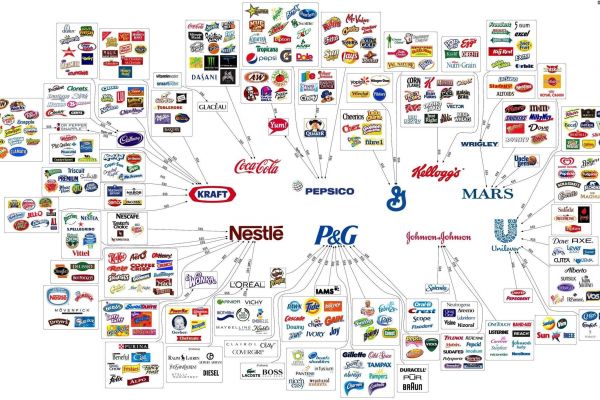A surprisingly small number of corporations control massive global market shares across various industries. From banking to media to food and beverage companies, these conglomerates have extensive control over what we buy and consume. In this article, we will dive into a detailed exploration of who owns what companies across the world.
Key Takeaways:
Page Contents
- 1 The Banking Industry’s Powerhouses
- 2 Food and Beverage Giants
- 3 Power Players in the Oil Industry
- 4 The Illusion of Choice in Consumer Brands
- 5 The Global Reach of Nestlé
- 6 Johnson & Johnson’s Influence on Pharmaceutical and Consumer Goods
- 7 The Wide Range of Products Under Pepsico
- 8 Procter & Gamble’s Dominance in Consumer Goods
- 9 Unilever’s Global Presence in Consumer Goods
- 10 BlackRock’s Investment Influence
- Global company ownership is concentrated in the hands of a few powerful conglomerates.
- These conglomerates have control over various industries, including banking, media, and food and beverage.
- Understanding who owns what companies helps shed light on the extent of their influence on our daily lives.
- The global corporate ownership landscape can be explored through various databases and resources.
- The consolidation of ownership in certain industries raises questions about competition and consumer choice.
The Banking Industry’s Powerhouses
The banking industry is dominated by a select few multinational banks. These institutions, known as the largest global banks, wield immense power and influence within the banking industry and the global financial landscape. Among these powerhouses are:
- ICBC
- HSBC
- Deutsche Bank
- Credit Agricole Group
- BNP Paribas
- Mitsubishi UFJ Financial Group
- Barclays PLC
- JPMorgan Chase & Co.
- China Construction Bank Corp.
- Japan Post Bank
These banks boast trillions of dollars in assets and serve millions of customers worldwide. With their vast networks and global reach, they play a pivotal role in shaping the banking industry and the economies they operate.
Let’s take a closer look at some of these banking powerhouses:
ICBC (Industrial and Commercial Bank of China)
Disclaimer: This website offers generic information about individuals, brands, and businesses for entertainment and satire purposes. It does not provide financial advice or serve as an authoritative source. Content is based on various online sources and may be outdated or incorrect due to time and industry changes. Visitors should verify information independently and seek professional advice for decisions. All images are for visual demonstration only and do not represent real products or individuals. This site may earn an affiliate commission if any links are clicked on.
ICBC is the largest bank in the world by total assets and market capitalization. As a state-owned bank, it holds a significant position in the Chinese banking industry and plays a crucial role in China’s economic growth.
HSBC (Hongkong and Shanghai Banking Corporation)
HSBC is a global bank headquartered in London, with operations spanning over 64 countries and territories. It is recognized for its strong presence in Asia, Europe, and North America, offering a wide range of financial services to individuals, corporations, and institutions.
Deutsche Bank
Deutsche Bank is a German multinational investment bank and financial services company. It is one of the largest banks in Europe and has a robust presence in global markets, providing various banking and financial solutions to clients worldwide.
JP Morgan Chase & Co.
JP Morgan Chase & Co. is a leading global financial services firm and one of the oldest and largest investment banks in the United States. It offers a wide range of services in investment banking, asset management, and private banking, catering to individuals, corporations, and governments.
These banking powerhouses, along with other major institutions, have a substantial impact on the global economy, financial stability, and the everyday lives of individuals and businesses.
| Bank | Total Assets (in billions of USD) | Country |
|---|---|---|
| ICBC | 4,035 | China |
| HSBC | 3,124 | United Kingdom |
| Deutsche Bank | 1,611 | Germany |
| JP Morgan Chase & Co. | 3,689 | United States |
Media Conglomerates and Their Holdings
The media industry is dominated by a select few conglomerates that exercise significant control over the content we consume daily. These major media companies own a vast array of media outlets, including television networks, film studios, and publishing companies. Among the notable media conglomerates are:
Comcast Corporation
Comcast Corporation is a global media conglomerate that owns NBCUniversal, one of the world’s leading media and entertainment companies. In addition to operating NBC, Telemundo, and Universal Pictures, Comcast also provides cable television, internet, and telephone services.
The Walt Disney Company
The Walt Disney Company is a media powerhouse renowned for its iconic brands and entertainment properties. With ownership of notable entities such as ABC, ESPN, Pixar, Marvel Studios, and Lucasfilm, Disney commands a significant presence across multiple media platforms.
Time Warner Company
Time Warner Company is a major media conglomerate that owns an extensive portfolio of media properties, including Warner Bros. Entertainment, CNN, HBO, and DC Entertainment. Time Warner also encompasses cable networks such as TNT and TBS.
Viacom
Viacom is a leading global entertainment company focused on the production and distribution of engaging content. It controls networks like MTV, Nickelodeon, Comedy Central, and Paramount Pictures, contributing to its dominance in the entertainment industry.
News Corporation
News Corporation is a diversified media and information services company that owns numerous influential media outlets worldwide. Its portfolio includes FOX News, The Wall Street Journal, HarperCollins Publishers, and a significant stake in British broadcaster Sky.
“The control that media conglomerates exert over the media landscape is profound. These companies not only shape the narratives and stories we encounter daily but also hold immense power in influencing public opinion and culture.” – Media Analyst
As these media conglomerates continue to expand their reach and influence, the concentration of media ownership raises questions about diversity, competition, and the free flow of information within the industry.
| Media Conglomerate | Notable Holdings |
|---|---|
| Comcast Corporation | NBCUniversal, NBC, Telemundo, Universal Pictures |
| The Walt Disney Company | Disney, ABC, ESPN, Pixar, Marvel Studios, Lucasfilm |
| Time Warner Company | Warner Bros. Entertainment, CNN, HBO, DC Entertainment |
| Viacom | MTV, Nickelodeon, Comedy Central, Paramount Pictures |
| News Corporation | FOX News, The Wall Street Journal, HarperCollins Publishers |
Food and Beverage Giants
The food and beverage industry is heavily consolidated, with a few major corporations owning a wide range of popular brands. These companies have significant control over what we eat and drink, shaping our choices and influencing our preferences. Let’s take a closer look at some major food corporations that dominate the industry:
PepsiCo Inc
PepsiCo Inc. is one of the leading food and beverage companies globally, offering a diverse portfolio of products. From popular soft drinks like Pepsi and Mountain Dew to snacks like Lay’s and Doritos, PepsiCo has a strong presence in both the beverage and snack markets.
Tyson Foods Inc
Tyson Foods Inc. is a major player in the food industry, known for its poultry, beef, and pork products. With a wide range of brands under its umbrella, including Tyson, Hillshire Farm, and Jimmy Dean, Tyson Foods Inc. provides consumers with a variety of protein options.
Nestle
Nestle is a multinational food and beverage company that operates in various categories, including chocolate, dairy, coffee, and bottled water. With well-known brands like KitKat, Nescafé, and Nestea, Nestle has a global reach and a strong foothold in the industry.
JBS USA
JBS USA is a leading producer of meat and poultry products, supplying customers worldwide. With brands like Swift and Pilgrim’s, JBS USA plays a significant role in meeting the global demand for protein-rich foods.
Anheuser-Busch InBev
Anheuser-Busch InBev is one of the largest beer producers in the world, brewing popular brands like Budweiser, Stella Artois, and Corona. With a strong global presence, Anheuser-Busch InBev caters to the preferences of beer lovers around the globe.
These major food corporations and others like them hold considerable power in the food and beverage industry. Their products are found on store shelves worldwide, shaping our culinary experiences and influencing our daily choices.
It’s important to understand the impact of these corporations on our food landscape and the choices available to us as consumers. While they offer a wide range of products, it’s crucial to also explore options from smaller, independent brands that prioritize sustainability, quality, and ethical practices.
Power Players in the Oil Industry
The oil industry is dominated by a select few global companies that hold significant influence over the world’s oil production. These top oil producers, including Saudi Aramco, Gazprom, National Iranian Oil Co., ExxonMobil, and PetroChina, play a crucial role in meeting the global oil demand.
With their extensive operations and vast reserves, these oil companies have the power to shape the global energy market. They control a substantial share of oil production, ensuring a steady supply of this essential resource. Their activities have far-reaching implications, impacting everything from fuel prices to geopolitical relations.
Among these power players, Saudi Aramco stands out as the world’s largest oil company, with vast reserves and a dominant position in the global market. Gazprom, the Russian energy giant, is another leading player, exporting significant quantities of natural gas and maintaining a strong presence in European markets.
The National Iranian Oil Co. plays a vital role in Iran’s economy, while ExxonMobil, a U.S. multinational corporation, holds significant oil assets and operates across the globe. PetroChina, a subsidiary of China National Petroleum Corporation, is the largest oil producer in China and one of the key players driving the country’s energy sector.
“The global energy landscape is shaped by these oil companies, which wield immense power and influence. Their actions can have wide-ranging effects on economies, politics, and the environment.” – Energy analyst
Top Oil Producers Worldwide:
| Company | Country | Production (barrels per day) |
|---|---|---|
| Saudi Aramco | Saudi Arabia | 13,110,000 |
| Gazprom | Russia | 9,806,000 |
| National Iranian Oil Co. | Iran | 4,315,000 |
| ExxonMobil | United States | 3,886,000 |
| PetroChina | China | 3,822,000 |
The table above highlights the production figures of the top oil producers in the world. These companies possess the resources, expertise, and infrastructure necessary to meet the global oil demand. Their operations span continents and enable them to navigate the complex dynamics of the energy industry.
As oil continues to be a primary source of energy globally, these power players will continue to shape the trajectory of the oil industry. Their strategies and decisions will impact the world’s economy, energy security, and environmental sustainability.
The Illusion of Choice in Consumer Brands
When we walk down the aisles of supermarkets or browse online stores, we are often confronted with countless options for consumer brands. From personal care products to food and beverages, the choices seem endless. However, what many consumers don’t realize is that behind these seemingly independent brands, there is often concentrated ownership by a small number of major consumer goods companies.
Companies like Johnson & Johnson, Pepsico, Procter & Gamble, Unilever, Coca-Cola, Mondelez International, KraftHeinz, General Mills, and Kellogg’s hold a significant stake in the consumer goods market. These multinational corporations have strategically acquired and consolidated various brands across different categories, creating the illusion of choice for consumers.
For example, Johnson & Johnson, known for its healthcare products, owns popular brands like Aveeno, Neutrogena, and Band-Aid. Pepsico, a major player in the food and beverage industry, manages a diverse portfolio that includes Pepsi, Lay’s, Tropicana, and Quaker. Procter & Gamble, another consumer goods giant, owns well-known brands like Gillette, Tide, and Olay.
These major companies have mastered the art of marketing and branding, creating strong consumer loyalty and trust. They invest heavily in research and development, advertising, and distribution to ensure their brands remain at the forefront of consumers’ minds.
While we may have a vast array of options when it comes to consumer brands, the truth is that our choices are often limited to products owned by a few major players. The consolidation of brand ownership has both advantages and disadvantages.
“The consolidation of consumer goods companies allows for economies of scale and increased efficiencies in manufacturing and distribution. It also enables companies to invest more in innovation and product development. However, it can also stifle competition and limit the diversity of products available in the market.”
As consumers, it is essential to be aware of the ownership behind the brands we choose. By understanding the landscape of consumer goods companies, we can make more informed decisions and support smaller, independent brands if desired.
Next time you reach for a product on the store shelf, take a moment to consider the larger picture of ownership behind it. The illusion of choice may persist, but armed with knowledge, you can navigate the consumer goods market more consciously.
The Global Reach of Nestlé
Nestlé, a Swiss multinational food and drink processing conglomerate, has established itself as a major player in the global food industry. With a wide range of notable brands under its umbrella, Nestlé has a significant presence in various food and beverage categories, catering to the diverse tastes and preferences of consumers around the world.
Some of the notable brands owned by Nestlé include:
- Alpo
- Carnation
- KitKat
- Nescafé
- Gerber
These brands have become household names and are widely recognized for their quality and reliability. Nestlé’s extensive portfolio covers a broad spectrum of food and beverage products, ranging from coffee and chocolate to baby food and dairy products.
“With its diverse collection of brands, Nestlé has successfully positioned itself as a global leader in the food industry, offering a range of products that resonate with consumers worldwide.”
Expanding Horizons
Nestlé’s multinational presence enables it to reach consumers in numerous countries, serving their diverse culinary needs and preferences. The company’s commitment to quality, innovation, and sustainability has solidified its reputation as a trusted provider of food and beverage products.
The success of Nestlé and its notable brands is a testament to the company’s ability to adapt to changing consumer demands and consistently deliver products that meet high standards. As one of the most recognized names in the food industry, Nestlé continues to shape the global landscape with its unwavering commitment to excellence and customer satisfaction.
| Notable Brands Owned by Nestlé |
|---|
| Alpo |
| Carnation |
| KitKat |
| Nescafé |
| Gerber |
Johnson & Johnson’s Influence on Pharmaceutical and Consumer Goods
Johnson & Johnson, a renowned company in the pharmaceutical and consumer goods sectors, holds a significant presence in the market. With notable brands like Band-Aid, Listerine, Neutrogena, and Tylenol, Johnson & Johnson dominates the healthcare and personal care industries.
As a pharmaceutical company, Johnson & Johnson focuses on the research, development, and production of various medications and medical devices. Their commitment to innovation and quality has made them a trusted name in healthcare.
Additionally, Johnson & Johnson is a prominent consumer goods company that offers a wide range of products for everyday use. Their diverse portfolio covers personal care items, baby care products, and household essentials.
Through their notable brands, Johnson & Johnson has established a strong presence in the global market, catering to the needs of consumers across different demographics. Their commitment to safety, effectiveness, and responsible business practices has earned them the trust of millions worldwide.
By leveraging their expertise in both the pharmaceutical and consumer goods sectors, Johnson & Johnson continues to make a significant impact on people’s lives. Whether it’s through providing essential healthcare products or enhancing everyday well-being, Johnson & Johnson remains a key player in shaping the industries it operates in.
The Wide Range of Products Under Pepsico
Pepsico, a renowned food and beverage company, holds a diverse portfolio of brands that cater to various consumer preferences. From refreshing beverages to savory snacks, Pepsico offers a wide range of products that have become household names.
One of Pepsico’s most notable brands is Pepsi, a globally recognized cola beverage that has been enjoyed by millions for decades. Whether it’s the classic Pepsi taste or the refreshing Diet Pepsi, this brand has become synonymous with carbonated beverages.
For sports enthusiasts and those looking for hydration options, Gatorade is Pepsico’s go-to brand. With a range of flavors and products designed to replenish electrolytes, Gatorade has become a preferred choice among athletes and fitness enthusiasts worldwide.
When it comes to satisfying cravings, Pepsico’s Doritos brand comes to mind. These crispy tortilla chips are available in a variety of flavors, offering a bold and flavorful snacking experience.
For those in search of refreshing and nutritious options, Pepsico’s Tropicana is a trusted brand. Known for its delicious fruit juices, Tropicana offers a wide range of flavors packed with essential vitamins and minerals.
Not only does Pepsico cater to beverages and snacks, but it also offers refreshing tea options through its Lipton brand. With a selection of black, green, and herbal teas, Lipton provides a soothing and flavorful experience for tea enthusiasts.
“Pepsico’s extensive portfolio of brands ensures that consumers have a wide range of options to choose from, catering to their unique tastes and preferences.” – Pepsico Executive
| Notable Brands Owned by Pepsico |
|---|
| Pepsi |
| Gatorade |
| Doritos |
| Tropicana |
| Lipton |
Pepsico’s commitment to providing a diverse range of high-quality products has made it a trusted choice for consumers around the world. With its iconic brands and continuous innovation, Pepsico remains at the forefront of the food and beverage industry.
Procter & Gamble’s Dominance in Consumer Goods
Procter & Gamble (P&G) is a leading consumer goods company with a wide range of notable brands in its portfolio. With a rich history that spans over 180 years, P&G has established itself as a trusted name in the industry. The company is committed to improving the lives of consumers around the world through innovative products that cater to their everyday needs.
P&G’s portfolio includes renowned brands that have become household names. From personal care products to home care essentials, P&G offers a diverse range of high-quality goods that enhance the lives of millions of people globally. Some of the notable brands owned by P&G include:
- Crest
- Tide
- Olay
- Gillette
These brands have become synonymous with quality, reliability, and effectiveness. Crest is a leading oral care brand known for its toothpaste and dental hygiene products, while Tide is an iconic laundry detergent brand trusted by families for generations. Olay is a skincare brand that offers a range of products for various skin concerns, and Gillette is a pioneer in shaving and grooming products for both men and women.
Through continuous research and development, P&G ensures that its brands meet the evolving needs and preferences of consumers. With a global presence and a commitment to sustainable practices, P&G strives to create products that not only improve lives but also contribute to a better future.
The Impact of Procter & Gamble’s Brands
“Procter & Gamble’s brands have become an integral part of our daily lives. From starting our mornings with Crest toothpaste to keeping our clothes clean with Tide, P&G’s products are trusted companions in every household.”
Procter & Gamble’s dominance in the consumer goods industry is a testament to its commitment to innovation, quality, and customer satisfaction. With its diverse range of notable brands, P&G continues to shape the market and raise the bar in product excellence.
| Brand | Category | Description |
|---|---|---|
| Crest | Oral Care | Toothpaste and dental hygiene products |
| Tide | Laundry Care | Laundry detergents and fabric care products |
| Olay | Skincare | Facial cleansers, moisturizers, and anti-aging products |
| Gillette | Shaving and Grooming | Razors, shaving creams, and grooming accessories |
Procter & Gamble’s commitment to excellence and its ability to deliver products that meet consumers’ needs have positioned the company as a leader in the industry. Through its portfolio of notable brands, P&G continues to enhance people’s lives and make a meaningful impact in the world of consumer goods.
Unilever’s Global Presence in Consumer Goods
Unilever, a British multinational consumer goods company, holds an extensive portfolio of notable brands that cater to various consumer needs. With a global presence, Unilever has established itself as a key player in the consumer goods market, providing products in both personal care and food categories.
In the personal care segment, Unilever owns popular brands like Dove, Rexona, and Axe. These brands offer a wide range of products including body wash, deodorants, and grooming essentials, catering to different consumer preferences and lifestyles.
Furthermore, Unilever’s presence extends to the food sector with renowned brands like Knorr and Ben & Jerry’s. Knorr offers a diverse range of food products including soups, sauces, and seasonings, while Ben & Jerry’s indulges consumers with its popular ice cream flavors.
“Unilever’s commitment to delivering high-quality products across the globe has solidified its position as a leading consumer goods company.”
Unilever’s dedication to sustainability and social responsibility has also made it stand out in the industry. The company has implemented initiatives to reduce its environmental impact and promote fair trade practices, aligning its business operations to create a more sustainable future.
| Product Category | Notable Brands |
|---|---|
| Personal Care | Dove, Rexona, Axe |
| Food | Knorr, Ben & Jerry’s |
BlackRock’s Investment Influence
BlackRock, the world’s largest asset manager, wields significant influence through its investments in various companies across different industries. As a renowned investment company, BlackRock holds stakes in major corporations like Apple, Microsoft, Amazon, and Alphabet. These notable investments by BlackRock not only solidify its position as a key player in the financial market but also have a profound impact on the global economy and stock market.
With its extensive portfolio, BlackRock’s investment decisions shape the financial landscape, driving market trends and impacting the performance of the companies it invests in. The company’s strategic investments provide support and growth opportunities to the companies, while also influencing their corporate strategies, governance practices, and overall market positioning.
BlackRock’s investment influence extends beyond individual companies. As a major shareholder, BlackRock has the power to advocate for environmental, social, and governance (ESG) concerns. The company actively engages with its portfolio companies to promote sustainable practices, responsible investment strategies, and increased transparency.
In conclusion, BlackRock’s status as the world’s largest asset manager and its notable investments in various companies give it significant investment influence, impacting not only the companies it invests in but also the global economy and stock market. Through its strategic investments and active engagement, BlackRock plays a pivotal role in shaping corporate practices and fostering sustainable growth in the financial industry.
Also Read, Smolsprout, Martin Braithwaite, and Victoria Mercado.





